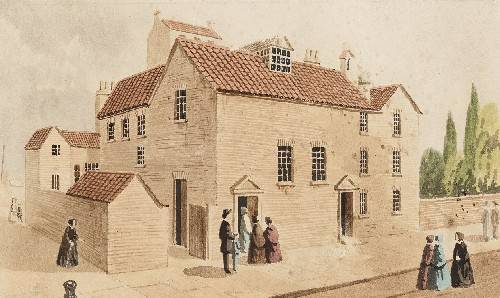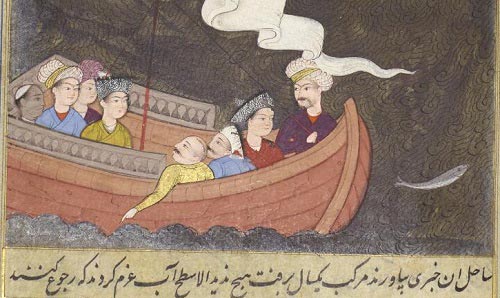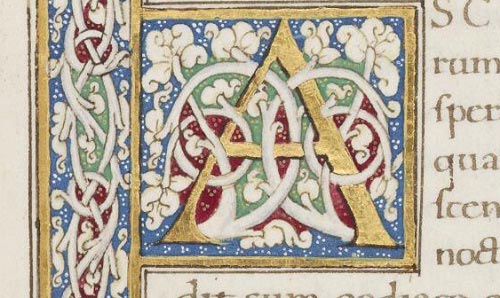
Methodist Archives and Research Collections
The Methodist Archives and Research Centre (MARC), established by the Methodist Church of Great Britain, has been held on deposit at the Rylands since 1977.

Generally acknowledged to be one of the finest research resources in the world for the study of evangelical religion in its broad social, political and economic context, it incorporates print collections and important archive and manuscript material. The collections are of major significance for a wide range of disciplines, including social and cultural history, the history of emotions, gender studies, literary studies and linguistics, as well as the history of organised religion, spirituality and personal faith from the 18th century to the present day.
The Church’s collections of missionary materials are held by the School of Oriental and African Studies (SOAS), in London.
John Wesley and the Wesley Family
The MARC holds the world’s largest collection of manuscripts relating to the founders of Methodism, John Wesley (1703-1791) and his brother Charles (1707-1788), and other members of the Wesley family. This collection contains approximately one-third of John’s extant correspondence, comprising just over 700 autograph letters, together with his diaries, sermons, annotated printed material and miscellaneous notebooks. Charles is represented by over 650 manuscript letters, the manuscript of his journal, all of his extant sermons and other miscellaneous papers. In all, the collection comprises approximately 5,000 letters, notebooks and associated papers of the period 1700-1865.
The collections also include the printed works of John Wesley, numbering over 1300 items and the family library of Charles Wesley consisting of over 400 volumes.
Early Methodism
Prominent eighteenth-century Evangelicals, other than the Wesleys, whose personal papers are represented in the collections include George Whitefield (1714–1770), the Countess of Huntingdon (1707–1791), Howel Harris (1714–1773) and Benjamin Ingham (1712–1772). In addition, there is a substantial collection of manuscript material relating to John Fletcher (1729–1785) of Madeley and his wife, the female preacher Mary Bosanquet-Fletcher (1739–1815), in the Fletcher-Tooth Collection; the collection comprises several thousand letters, journals, diaries and commonplace books together with spiritual autobiographies, sermons, scripture notes and associated papers.
The MARC also contains the personal library of John Fletcher, along with a fine collection of 18th-century anti-Methodist printed material and thousands of tracts and pamphlets dating from 1568 onwards.
Additionally there is a substantial collection of early hymnals, including the only complete copy of John Wesley’s Charleston Hymnbook.
Personal papers
The Methodist Archives include numerous small collections of personal papers relating to approximately 4,000 ministers and lay-Methodists from the eighteenth century to the present. These include Thomas Coke (1747–1814), Joseph Benson (1748–1821), Adam Clarke (1760–1832), William Clowes (1780–1852), Hugh Bourne (1772–1852), Jabez Bunting (1779–1858), John Rattenbury (1806–1879), John Ernest Rattenbury (1870–1963), Harold Burgoyne Rattenbury (1878–1962), and Dr Rupert Davies (1909–1994).
Institutional records
The institutional records of Methodism are very well represented, with material relating to all the major pre-union Methodist denominations, including the Lewis Court Bible Christian Collection. These include over 5,000 volumes of magazines and newspapers containing a full run of the Wesleyan Methodist Magazine (formerly Arminian Magazine), the Primitive Methodist Magazine and Bible Christian Magazine. Modern periodicals, such as MetConnexion, Connexion and journals of the Wesleyan Historical Society continue to be added to the MARC.
The archives of the Methodist Conference and its numerous committees reflect the successive splits and subsequent reunification of the Methodist denominations; there are Conference records for each of the pre-1932 Methodist churches in Britain, the largest and most comprehensive being those of the Wesleyan Methodists. The most revealing documents are the unique manuscript journals of Conference proceedings; these contain significantly more detail than the published minutes.
The MARC also contains a complete set of published conference minutes and many agendas.
There are large archives deposited by the administrative Divisions of the Church, such as the Property Division, the Home Mission Department, the Divisions of Social Responsibility, Ministries, Education and Youth and the Armed Forces Board.
The divisional records contains a wealth of information that is of interest to historians of religion, politics, social studies, education and other disciplines, and to a lesser degree, genealogists and local historians.
The Property Division archive, for example, includes lists of Wesleyan chapels with details of the date and cost of their construction, while the archive of the Division of Ministries incorporates papers relating to the acceptance of candidates for the ministry.
The Armed Forces Board collection contains material relating to the work of Methodist chaplains in Britain and abroad.
The MARC contains an extensive collection of District records, especially for the Wesleyan Methodists. The core documents are the minutes of the district meetings, these contain character assessments of applicants for local preachers, information on ministers and their families, and detailed statistics of chapel and circuit membership.
In 1791, as part of a restructuring following John Wesley’s death, Methodist circuits were grouped into districts, analogous to Anglican dioceses. The MARC holds the world’s largest collection of circuit plans up to 1933 (over 5,000), which record the names of itinerant and local preachers in particular circuits, and can be used to chart the growth and decline of Methodism at the local level.
The Methodist movement has been deeply involved in the education of children and adults since the mid-eighteenth century, and there are several collections relating to these activities.
There are major archives of three ministerial training colleges – Handsworth (Birmingham), Hartley Victoria (Manchester) and Richmond (Surrey) – while smaller collections survive for Didsbury and Sunderland Colleges.
The MARC also holds the archives of the Wesleyan Theological Institute, which supervised all the constituent colleges, and of Southlands College, Wimbledon, the Methodist teacher-training institute. In addition, the libraries of former training colleges Didsbury College, Richmond College, Hartley Victoria College and Wesley College Bristol are represented in the collection.
Monographs pamphlets and periodicals
The printed holdings of the MARC include thousands of published items spanning the history of Methodism and related evangelical movements, including some rare and unique copies. Many are from the libraries of former Methodist theological collections, while others have been collected by the Church in the twentieth century. Subjects include early Methodist print, debates within Methodism, hymnology, education, fiction and some specialist periodicals.
Special attention should be drawn to the Green collection of 2,865 copies of 1,783 pamphlets authored by the Wesley brothers and their associates; the Green Anti-Methodist Collection, which comprises 396 copies of 348 works published mainly in the 18th century and is the largest such collection in the world; and the Charles Wesley Family Library, which contains over 430 volumes owned by Charles and his immediate family.
The collection also reflects the latest research on Methodism in its policy of purchasing contemporary works on the subject.
List of collections
Physical collections
- Joseph Benson Papers
- Hugh Bourne Collection
- Adam Clarke Papers
- William Clowes Papers
- Thomas Coke Papers
- Lewis Court Bible Christian Collection
- Rupert Davies Papers
- Early Preachers Collection
- Fletcher-Tooth Collection
- Hartley Victoria College Collection
- Methodist Printed Book and Periodical Collections
- Harold Burgoyne Rattenbury Papers
- John Ernest Rattenbury Papers
- John Rattenbury Papers
- Frank Owen Salisbury Papers
- Wesley Collection (Rylands)
- Wesley Family papers (Methodist Collections)
- Charles Wesley Family Library
- Charles Wesley Papers
Digital collections
-
Methodist Collection in Library Digital Collections
Further information
Finding aids
Summary information about all our Methodist holdings and an introduction to more detailed catalogues and finding aids can be found in the Guide to Methodist Resources at the University of Manchester.
A detailed list of MARC archive holdings can be found in the Methodist Archives Collections Catalogue.

Exploring subject areas
An overview of our Special Collections, including information about the background and history of our holdings.

Special Collections A-Z
Explore the Special Collections through the collection names and descriptions using our searchable A-Z tool.
